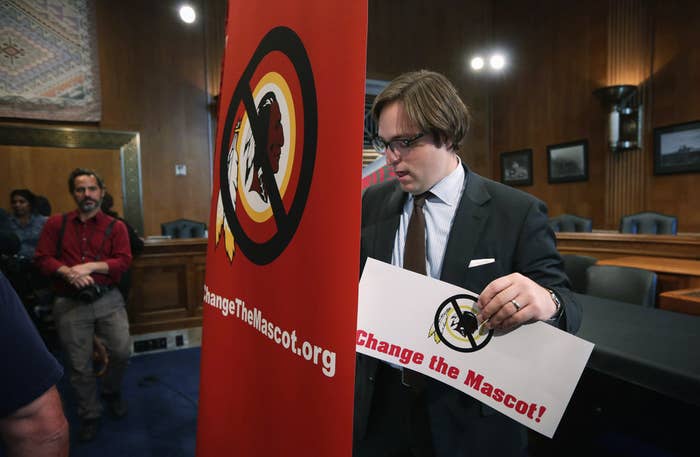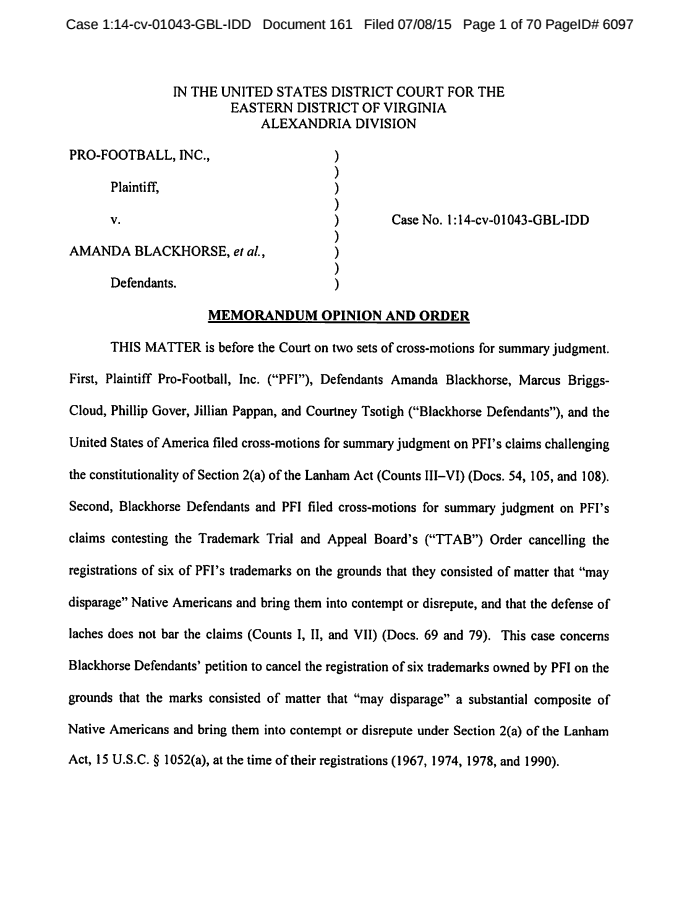
A federal judge in the Eastern District of Virginia has agreed that the Washington Redskins should lose their federal trademark registration because the term is "disparaging" to Native Americans.
In a statement issued to BuzzFeed News, attorney Jesse Witten — who represents the defendant, Navajo activist Amanda Blackhorse — called it "a victory for human dignity and for my courageous clients who have waited so long for this ruling."
Team president Bruce Allen said the team was "surprised by the judge's decision to prevent us from presenting our evidence in an open trial. We look forward to winning on appeal after a fair and impartial review of the case. We are convinced that we will win because the facts and the law are on the side of our franchise that has proudly used the name Redskins for more than 80 years."
In his opinion, Judge Gerald Bruce Lee agreed that there is evidence that the term was known to possibly "disparage a substantial composite of Native Americans" when the trademark registration was issued in 1967.
The team's registered trademark was first stripped in 2014, when the Trademark Trial and Appeal Board found the term was disparaging to Native Americans.
In an interview with BuzzFeed News last week, the team's longtime attorney, Bob Raskopf, said the team would immediately appeal to the 4th circuit if the judge did not rule in their favor.
In a statement to BuzzFeed News, Raskopf said (emphasis his):
"After today's ruling, the Washington Redskins still own their trademarks. [...] The Redskins will appeal the district court's ruling on all grounds, both Constitutional and Lanham Act. The Redskins' rights will be vindicated on appeal and will remain unaffected, as has consistently been the case throughout the 23-year history of this litigation."
The decision in the 4th circuit will likely be appealed to the Supreme Court. The team is allowed to use the name and logo as a registered trademark until the appeals process is finished.
In the decision, Lee quoted the outspoken former NBA player, Allen Iverson:
"Just as Allen Iverson once reminded the media that they were wasting time at the end of the Philadelphia 76ers' season 'talking about practice' and not an actual professional basketball game, the Court is similarly compelled to highlight what is at issue in this case — trademark registration, not the trademarks themselves."
The team has argued that the Lanham Act — which says a registered trademark cannot be issued if it "may disparage" a group of people — violates their First Amendment rights. Lee argued that the registration "cancellations do not burden, restrict, or prohibit [the team's] ability to use the marks."
In short: The Washington Redskins can still use the name, mascot, and any associated imagery as a legal trademark, but without government registration, so can anyone else. In the past, the team has said the loss of the registration would cause significant loss of profit.
Trademark registrations are issued by the U.S. Government, and the arguments heard by Lee focused heavily on the issue of "government speak," and whether or not having a government seal on a registration is in essence an endorsement of the trademark. This was recently debated in the Supreme Court on the subject of government-issued license plates bearing the Confederate flag. The Supreme Court ruled against the use of the flag, and Lee agreed in his opinion today.
"It is within the discretion of the federal government to deny registration to marks that 'may disparage,'" he said.
Team owner Dan Snyder has said on numerous occasions that he will "never" change the name, arguing it "honors" Native Americans.
Lee agreed that the team produced "evidence that some members of the Native American community did not ever, and do not now, find 'redskin' disparaging, whether in the context of the 'Washington Redskins' or not." However, he listed significant evidence presented by Blackhorse's team that evidence from dictionaries, media, and statements from Native Americans between 1967 and 1990 that he feels is evidence enough to conclude that the term was known to possibly "disparage" Native Americans at the time.
In an interview last week, Raskopf argued that those who oppose the term are a small, but vocal, minority, and that "white people think 'Redskins' is worse than Native Americans do."

